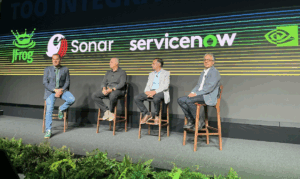
My mother used to tell me, “Show me your friends, and I’ll show you who you are.” Sitting in the audience at JFrog’s swampUP keynote this week in Napa, I couldn’t help but hear that echo when JFrog CEO Shlomi Ben Haim brought executives from Sonar, ServiceNow, and NVIDIA on stage. The message was unmistakable: if you want to judge JFrog’s approach to AI and the software supply chain, look at the company it keeps.
And what a group of friends it is. Sonar has long been synonymous with code quality. ServiceNow defines digital workflow and IT operations at enterprise scale. NVIDIA powers the AI revolution at its core. By putting these logos next to JFrog’s own frog crown, Ben Haim was making a bigger point: JFrog doesn’t just want to ride the AI wave—it wants to be the system of record at the center of it, flanked by trusted allies.
The Big Question: Will AI Replace Developers?
The panel addressed a question that’s been haunting developer communities: will AI replace developers? The consensus on stage was reassuring—only if we let it. AI can accelerate coding, automate compliance, and even help govern software releases, but the human judgment, creativity, and accountability in building software can’t be replaced wholesale.
Shlomi’s view, echoed by the panelists, was that AI should be woven into the workflow, not positioned as a replacement. JFrog’s goal is to ensure that as AI becomes a first-class citizen in software delivery, there’s a trusted system of record to anchor it all.
The Announcements Behind the Narrative
This keynote wasn’t just talk. It was underscored by a series of announcements that JFrog rolled out this week at swampUP:
- JFrog Fly – The Agentic Repository
JFrog Fly introduces the world’s first “agentic repository,” built to support AI-native workflows. It offers semantic release management, zero-config delivery, and integrations with AI tools like GitHub Copilot, Cursor, and Claude Code. Fly is JFrog’s bet that developers working alongside AI agents will need the same kind of structured, trusted artifact management that Artifactory brought to DevOps a decade ago. - JFrog AppTrust – Governance as DevGovOps
Compliance has become the new bottleneck in software delivery. AppTrust answers that by automating governance and providing evidence-based policies. Integrated with ServiceNow, Sonar, and others, it reframes governance not as an obstacle but as an accelerator—ensuring releases are trusted and verified before they ship. - JFrog AI Catalog – Governing the AI Flood
With the explosion of AI models, enterprises need a way to securely discover, govern, and deploy them. JFrog’s AI Catalog provides that hub, with integrations spanning NVIDIA’s Nemotron models, Hugging Face, and Anthropic. This is Artifactory for the AI era—a single source of truth for model governance and compliance. - AppTrust Evidence Ecosystem – Verifiable Trust
JFrog also introduced an ecosystem of evidence partners, including GitHub, ServiceNow, and Sonar, to provide cryptographically signed attestations across the software supply chain. In a world where AI agents will increasingly make deployment decisions, having verifiable proof attached to every artifact isn’t optional—it’s table stakes.
Together, these announcements show JFrog’s vision: a future where speed, trust, and AI-native workflows converge.
Show Me Your Friends, Show Me Your Future
Back to that stage moment with Sonar, ServiceNow, and NVIDIA. Partnerships like these are not just logos for a slide deck. They embody JFrog’s strategy: to remain the connective tissue across the software supply chain, while surrounding itself with leaders in quality, operations, and AI.
Ben Haim’s message was clear: JFrog doesn’t want to go it alone. It wants to be at the center of an ecosystem that organizations can trust. If governance, compliance, and AI-native software are the future, JFrog wants its frog crown stamped on the artifacts, the evidence, and the audit trails that power that future.
Shimmy’s Take
I’ve been covering DevOps and software delivery for more than a decade. I’ve seen plenty of hype cycles, and I’ve seen plenty of companies make bold claims about changing the world. What struck me in Napa was that JFrog isn’t just talking—it’s building.
The Fly repository, AppTrust governance, AI Catalog, and evidence ecosystem aren’t vaporware. They’re real products aimed at real problems: the AI governance gap, the compliance bottleneck, the need for trust in the supply chain.
So yes, judge JFrog by the friends it keeps. But also judge it by the work it’s doing to turn AI hype into enterprise-ready solutions. If this is the company JFrog is keeping—and the direction it’s heading—the rest of the industry would do well to pay attention.
More to Come
SwampUP isn’t over, and I expect we’ll hear even more from JFrog as the week goes on. Techstrong and Techstrong TV are here on the ground capturing conversations, streaming sessions, and providing coverage. Stay tuned for Jon Swartz’s reporting and our upcoming video features.
For now, I’ll leave you with this: the future of AI in software development isn’t about replacing humans. It’s about building systems of trust, governance, and collaboration. And at swampUP 2025, JFrog made a strong case that they, along with their friends, intend to lead the way.


